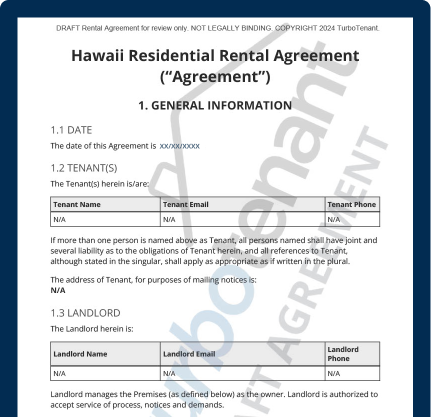With 240 sunny days per year on average, Hawaii is just about anyone’s idea of a tropical paradise. And as one of the nation’s most desirable places to live, landlords will find a steady supply of tenants looking to make Hawaii their home.
Making sure the rights of both parties are understood, though, ensures that rental relationships go well. So, we’ve compiled a guide covering everything you need to know, including information on Hawaii tenant rights, rental lease agreements, and the eviction process.
Keep reading to learn more.
Marketing. Applications. Leases. Payments.
Key Findings: Landlord-Tenant Rights & Responsibilities
Landlords and tenants must fulfill specific responsibilities to receive their respective rights in the rental relationship. Here are some of the most important rules to know:
Hawaii landlords have the right to:
- Charge an application fee.
- Charge a security deposit.
- Charge rent and late fees for overdue rent.
- Enter the property when necessary.
- Evict tenants when necessary.
Hawaii landlords are responsible for:
- Providing safe, habitable housing.
- Maintaining provided appliances and common areas.
- Returning security deposit within 14 days
- Notifying the tenant two days before entering the unit.
- Abiding by lease terms.
Hawaii tenants have the right to:
- Access safe, habitable housing.
- Privacy within the dwelling unit.
- Receive advance notice of rent increases.
- Withhold or deduct from rent if the landlord fails to make repairs.
- Receive security deposit and statement of deductions after moving out.
Hawaii tenants are responsible for:
- Paying rent in full and on time.
- Maintaining the unit aside from normal wear and tear.
- Refraining from disturbing other residents.
- Allowing access to the unit when necessary.
- Abiding by lease terms.
Best Practices for Screening Prospective Tenants
Landlords should always screen rental applicants to ensure they will be trustworthy tenants. A new Hawaii landlord-tenant law, HI Rev Stat § 521-46, limits rental application fees to the actual screening costs and requires landlords to return any unused fees within 30 days.
During the screening, landlords may look at a tenant’s criminal and/or credit history. These considerations must apply equally to all tenants, and landlords must abide by federal regulations, including the Fair Credit Reporting Act.
To learn more about an applicant’s background and rental history, use TurboTenant’s Tenant Screening features.
Compliance with Fair Housing Laws in Hawaii
In Hawaii, federal and state fair housing laws allow tenants to seek safe, habitable housing equally, regardless of race, gender, and sexuality. These laws have significant ramifications for both landlords and tenants.
What actions are considered housing discrimination?
Many acts constitute housing discrimination, such as refusing to rent to tenants of a specific religion or screening tenants of a certain race more strictly. Landlords must also conduct rental advertising equally. In other words, property ads must not favor a race, sexual identity, or familial status over another. For example, landlords cannot write “No kids allowed” on their ads.
Additionally, Hawaii law prohibits discrimination against those with human immunodeficiency virus or HIV (HI Rev Stat § 515-3).
How can discrimination be avoided in rental practices?
To avoid housing discrimination, landlords must advertise to, screen, and apply lease terms equally to all tenants. Additionally, landlords must allow individuals with disabilities to make reasonable adjustments to the unit that would allow them to rent (HI Rev Stat § 515-3).
Finally, landlords should train staff on fair housing practices. Under Hawaii landlord-tenant law, landlords are liable for discriminatory acts employees commit.
What are the repercussions for fair housing violations?
If a landlord is found to have violated fair housing laws, they could be charged fines of thousands of dollars and lose their rental license.
When accused of a fair housing violation, landlords must document all evidence supporting their case and obtain civil legal assistance to fight the allegations in court.
Hawaii Lease Agreements
In Hawaii, leases may be verbal or written. However, a written rental contract is required for leases lasting a year or more. Regardless of the lease’s length, we recommend a written Hawaii lease agreement to clarify each party’s legal standing.
In terms of lease lengths, most rental contracts operate month-to-month or fixed-term. Month-to-month leases typically expire and renew at the end of every month until either party terminates the agreement, while fixed-term leases expire on a set date and must then be renewed or terminated.
If you’re looking for an easy way to create a lease agreement, consider TurboTenant’s lease agreement builder. It’s easy to use: Just fill in the blanks and e-sign it from anywhere.
Which lease terms are legally required in Hawaii?
Leases in Hawaii must include a property description, the names and addresses of both landlord and tenant, information about rent, and the lease length.
Any terms that waive tenants’ rights are prohibited (HI Rev Stat § 521-33).
What constitutes legal renting in Hawaii?
Rental properties in Hawaii must meet all applicable safety and health standards. Occupancy limits vary by unit size; for example, two people may reside in a one-bedroom apartment, while four-bedroom rentals are limited to five tenants (HI Rev Code § 15-308-62).
What tenant documentation is required?
Landlords usually ask tenants to provide documents such as a valid ID, proof of income, and consent for a background check. Hawaii landlord-tenant law also requires landlords to provide tenants with a copy of the lease (HI Rev Stat § 521-43).
Both landlords and tenants should maintain records of all relevant documents to prevent future disputes over the rental agreement.
What are the mandatory landlord disclosures in Hawaii?
Federal law mandates that landlords disclose the known presence of lead-based paint. In Hawaii, additional disclosures include the landlord and/or authorized agent’s identity and the landlord’s tax excise number (HI Rev Code § 521-43).
If the landlord lives off the island where the premises are located, they must disclose the contact information of an “on-island agent” within the lease (HI Rev Code 521.43).
The tenant may recover $100 plus reasonable attorney fees if the landlord fails to disclose any of this informtion (HI Rev Stat § 521-67).
Security Deposits in Hawaii
Security deposits allow landlords to protect their property against damages or unpaid rent. As such, charging security deposits is a key part of the rental process.
What are the guidelines for security deposit collection?
Hawaii’s tenant rights limit landlords to charging one month’s rent as a security deposit (HI Rev Stat § 521-44). As mentioned above, the lease must also describe the property’s condition at the time of move in (HI Rev Code § 521-43).
Hawaii landlords do not have to store the deposit in a particular manner or notify tenants of its location. Unlike other states, they do not need to pay tenants interest on deposits.
When can deductions be made from security deposits?
Per the Hawaii State Judiciary, landlords may use security deposits to cover damages beyond normal wear and tear and unpaid rent. If the landlord deducts money from the deposit, they must notify tenants in writing of the amount and reason for the deduction (HI Rev Stat § 521-44).
How should security deposits be returned?
Within 14 days after the tenancy ends, landlords must return any remaining deposit funds and the aforementioned written statement. The full deposit must be returned if the landlord does not fulfill these conditions (HI Rev Stat § 521-44).
Maintenance Responsibilities of Landlords
As in other states, landlords in Hawaii have to provide safe, habitable housing for tenants. This includes adhering to all building and safety standards and maintaining the property in good working condition (HI Rev Stat § 521-42).
What are the legal standards for property conditions?
Hawaii tenant rights stipulate that rental properties meet all relevant health and safety standards. The landlord should ensure that provided amenities are functional and promptly complete any requested repairs (HI Rev Stat § 521-42).
What is the proper protocol for repairs?
If the landlord does not complete a requested repair within 3 business days, the tenant may complete the repair themselves and deduct the amount from the rent. However, the repair must significantly affect the unit’s habitability, and the cost may not exceed $500 or one month’s rent (HI Rev Stat § 521-64).
If landlords do not complete repairs within a reasonable time, tenants may withhold rent and cite a breach of the warranty of habitability (HI Rev Stat § 521-78).
Do landlords need to give tenants advance notice before accessing a rental property?
Landlords must notify tenants 2 days before accessing a dwelling unit and can only enter during reasonable times. No notice is required in emergencies (HI Rev Stat § 521-53).
If the landlord repeatedly fails to give notice, the tenant may take their landlord to court or terminate the rental agreement early without penalty on the basis of landlord harassment.
Late Rent Fee Regulations
Hawaii tenant rights in 2024 do not provide a grace period for tenants to pay rent; payment is due in full on the agreed-upon date. If rent becomes overdue, landlords may charge late fees of up to 8% of the rent (HI Rev Stat § 521-21).
Rent Control in Hawaii
Rent control laws strictly limit the amount of rent landlords may charge, while rent stabilization allows for incremental rent increases. As of 2024, Hawaii landlord-tenant law does not regulate rent pricing.
However, landlords must still follow specific regulations. Rent cannot be increased before the end of a lease term (unless the lease expressly permits it), and landlords must notify tenants 45 days before increasing rent (HI Rev Stat § 521-21).
Lease Renewal and Termination
Landlords in Hawaii do not have to renew expiring leases but must notify month-to-month tenants 45 days in advance. Tenants, meanwhile, must provide notice 28 days in advance (HI Rev Stat § 521-71).
If a tenant moves out before the lease ends, typically, they must continue to pay rent for the duration of the original agreement. However, breaking a lease is acceptable in certain cases: starting active-duty military service (50 U.S.C. App. §§501-597b), if the tenant is a victim of domestic violence (HI Rev Stat § 521-80), or if the unit is uninhabitable (HI Rev Stat § 521-43).
On the other hand, landlords may legally terminate a lease early to sell or change the use of a property. They must give at least 120 days in advance (HI Rev Stat § 521-71).
Eviction Procedures for Hawaii Landlords
Hawaii’s eviction process differs slightly but in crucial ways from other states. Hawaii landlords who need to remove a problematic tenant must be thoroughly aware of all laws on the subject to improve their chances of a successful eviction.
What justifications exist for eviction?
Landlords may evict tenants for violating lease terms, failing to pay rent, or conducting illegal activity on the premises. To remove a tenant without cause, landlords must give appropriate notice and wait until the lease ends.
Before beginning eviction proceedings, landlords must document all actions that led to the eviction to serve as evidence in court.
What is the eviction process?
Landlords who wish to evict a tenant must take the following steps:
- Serve an up to 10-day notice to vacate (HI Rev Stat § 521-68, HRS § 521-69)
- File an eviction lawsuit in Hawaii District Court (HI Rev Stat § 666-6)
- The court serves the tenant with a summons (HI Rev Stat § 666-8)
- The landlord and tenant attend court the hearing, present evidence, and receive judgment (HI Rev Stat § 666-11)
- The sheriff arrives to remove the tenant forcibly (if necessary) (HI Rev Stat § 666-11)
How is property reclaimed after eviction?
Landlords may secure the unit after the sheriff has removed the tenant. Hawaii law dictates that a value judgment be made if the tenant leaves behind abandoned belongings.
Landlords may dispose of items without value immediately. Otherwise, they may sell or donate the item after providing 15 days’ notice and circulating an advertisement for at least 3 days in a local daily newspaper.
Local Ordinances for Landlords and Tenants
In addition to Hawaii’s landlord-tenant laws, local regulations also govern rental relationships and may vary by city or county. For more information on landlord-tenant laws in your area, use resources such as Municode or American Legal Publishing.
Federal Landlord-Tenant Laws
Federal laws, such as the Americans with Disabilities Act, the Fair Credit Reporting Act, and the Fair Housing Act (FHA), also apply to all rental properties in the U.S.
For more information, visit the websites of the Federal Trade Commission, the Government Accountability Office, and the Consumer Financial Protection Bureau.
Managing Tenant Legal Disputes as a Hawaii Landlord
While many landlord-tenant disputes may be resolved via direct communication, further legal assistance can sometimes be necessary. Landlords facing legal disputes with tenants in Hawaii should investigate the following resources:
- The Hawaii Residential Landlord-Tenant Information Center: Provides Hawaii tenant rights hotlines and free information on state rental laws
- Hawaii Legal Aid Society: Offers free civil legal aid for low-income residents
- Hawaii State Bar Lawyer Referral: Nonprofit connecting clients with certified attorneys for free
Navigate Your Landlord-Tenant Relationship with TurboTenant
Though these resources can help, TurboTenant’s free property management software also provides tools to help both parties uphold their end of the Hawaii landlord-tenant law equation. They include:
- Rental advertising that adheres to fair housing laws
- Rental applications and screening that meets FHA and FCRA standards
- Lease agreement templates that include necessary property details
- Rent collection automates rent collection and can remind tenants of upcoming payments
Sign up for a free TurboTenant account for more assistance in navigating Hawaii tenant rights and other aspects of the rental process.
Hawaii Landlord-Tenant Law FAQs
What are landlords required to provide by law?
Landlords in Hawaii must provide safe, habitable housing for all tenants in accordance with health, building, and safety codes. Tenants may expect additional amenities as dictated by local market standards.
What is the proper notice period for lease termination?
Landlords must notify tenants up to 120 days in advance to terminate a lease. The notice period depends on the reason for the termination and the lease length.
How should utilities be handled in rental agreements?
Either landlords or tenants may be responsible for paying utilities. However, the lease must clearly outline this responsibility to avoid disputes, which could lead to costly legal action.
What maintenance rights do tenants have?
Tenants in Hawaii have the right to request and receive necessary repairs. If these repairs are not completed, tenants may conduct the repairs, subtract the cost from rent, or withhold rent altogether in certain cases.
What are the eviction rules for tenants without a lease?
Hawaii tenant rights apply even without a lease, as rental contracts may be verbal. So, if a landlord wishes to evict a tenant without a lease, they must follow the typical tenant eviction process.
How are guests and tenants legally differentiated?
Guests visit a property for short periods, do not pay rent or abide by the lease terms, and do not receive tenant rights. On the other hand, tenants live on the property full-time, pay rent, and abide by the lease terms, all of which grant them tenant rights.





